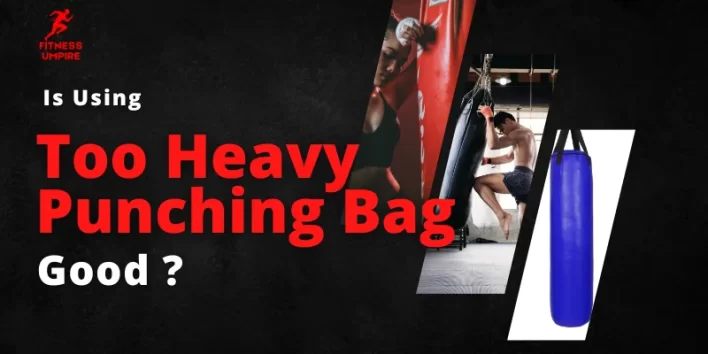
If your punching bag is too heavy, you may find it difficult to use effectively due to extra pressure during workout. It is important to choose a weight that is right for you. You should to try lighter punching bag or adjustable bag so you can adjust the weight as needed.
The main reason to avoid the use of a too heavy bag is that it puts pressure on body, especially your hands and arms. The weight of the bag can cause fatigue and muscle strain if it’s too heavy compare to your strength level. Also, the force of the blows you land on the bag can damage your joints if you have poor technique or don’t take the proper safety precautions.
Safety Tips for Using Heavy Bags
It is important to practice proper safety technique when using a heavy punching bag. First, always make sure your hands and wrists are properly wrapped and protected before you start exercising.
You should also maintain good posture and pay attention to your posture to avoid unnecessary stress on your joints. Also, be careful during actions or moving heavy bags, as any unexpected movement could cause injury.
Can You Use A Too Heavy Bag?
Whether you should use a heavy punching bag depends on your own fitness level and goals. If you’re trying to build strength and endurance, a heavier bag may be helpful.
However, if you’re new to exercising or have weak joints, a lightweight bag may be a better choice. Ultimately, the choice is yours and you should choose what works best for you.
The Ideal Weight for A Punching Bag
The ideal weight for a punching bag depends on your own fitness level and the type of exercise you want to do. For beginners, it is recommended to start with a light to medium weight bag (10-20 lbs.).
But, if you are more experienced or looking to build strength, a heavier bag (25-35 lbs.) may be more appropriate. Ultimately, you should choose the weight that works best for you and allows you to achieve your goals.
Too Heavy Punching Bag May Cause Injury
Using punching bags that are too heavy can lead to various injuries if proper safety techniques are not followed. Common injuries include wrist and finger strains or sprains, shoulder or arm pain, and even neck pain from poor posture.
To avoid these injuries, be sure to wear adequate protection, use proper form and technique, and choose a weight that works for you when hitting the bag.
Common Boxing Pains and Injuries
Common boxing injuries include sprains, strains, cuts and bruises, rotator cuff strains or tears, shoulder impingement, carpal tunnel syndrome, elbow pain, wrist fractures, jaw injuries, head trauma and concussions.
Pain after punching bag training is normal, but it’s part of boxing training. As a beginner, you can do this by doing proper stretching and warming up before training, wearing the correct protective gear (such as mouth guards, helmets, and hand straps), avoiding excessive force and hitting hard objects, and learning proper posture and technique to avoid these injuries.
With proper preventive measures or early awareness, you can easily cope with the following types of pains.
Pains After Hitting A Punching Bag
Punching bag workout build your body’s coordination, strength and stamina but you can also experience some common pains. If you feel any following pains, soreness in the muscles or symptoms of an injury just stop training until it heals.
Muscle Pain
Muscle soreness developing is common after resistive exercise with a punching bag. But don’t worry you can alleviate it with taking sufficient rest, water intake.
However, if the pain in muscles is severe it could be a minor pull or strain. For immediate comfort to reduce pain apply ice and take rest for some days.
Pain in Fingers and Hands
These types of pains occur due to using improper techniques while hitting a heavy bag. By not using the right punching methods or angles often beginner boxers got a hand fracture.
The hand or fingers injures often leads to a boxer fracture.
You can somehow prevent these injuries with the use of bandages and applying proper punching techniques. But, if you feel sharp pain in the bones of your hand, stop training immediately and see your doctor or trainer.
Wrist Pain
If you strike with your forearm and wrist in a straight direction, the force of the impact travels up your arm to the elbow, shoulder, and torso. While by bending your wrist can cause sprained or broken.
Similarly, with pain in your fingers and hands, you can reduce the risk of suffering this type of injury by wrapping this area for your session on the punching bag.
But if the pain in fingers, hands and wrest is sharp that indicates you should stop training and see a professional for an examination.
Pain in Elbows and Shoulders
Bad hitting or with loose grip you can have pain or injury in the larger joints of your arm. Mostly it is causing when punches off with loose hand of your center place. This can badly impact on your elbows and shoulders.
Resultantly it creates muscle strains and stressing injuries. First when you punch a bag, you should to direct the impact to the large muscles in your core.
Secondly, if you feel such a pain you can treat it with ice, but you should see your doctor for chronic discomfort or pain that limits your ability to move.
Headaches After Workout
Headaches are a very common thing among novice boxers after a heavy bag workout. These headaches often arise from few mistakes. Like holding breath and performing practice. This is not a good practice and your mind will not get the proper amount of oxygen.
The next is clenching the jaw that holds the breath and holding the muscles tight. Both the situations are not good and commonly leads to a headache.
To avoid from anyone such state always pay attention to the way you hit the bag. Breathe out sharply with each punch and inhale between punches to make sure you’re breathing properly. For avoiding clenching your jaw, you can wear a mouth guard to help absorb the pressure.
Learn more about :- Beginner Boxing Training
Conclusion
If your punching bag is too heavy, your chances of serious injury may be higher than usual. It can have a major impact on some of the smallest bones in the body.
As a newbie to boxing or boxing fitness, a punching bag that’s too heavy might not be a good option for you. Because, you may experience severe pain or severe injury.
Further you can read:- The Basic Factors While Choosing a Puching Bag
Professional boxers typically use heavier punching bags for strength training and conditioning. But still, the ideal weight of the bag will depend on the boxer’s fitness level and the type of workout they’re intend to do.
Also read about:- Various Categories and Design of Punching Bags
